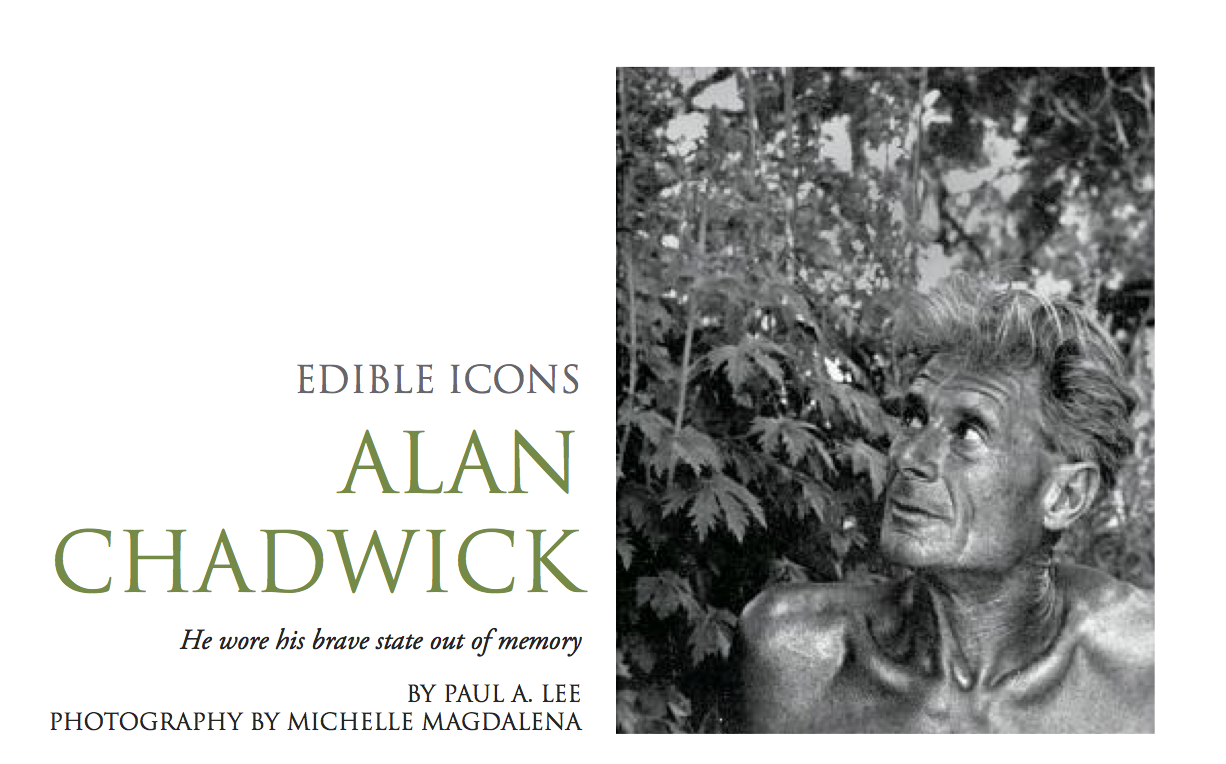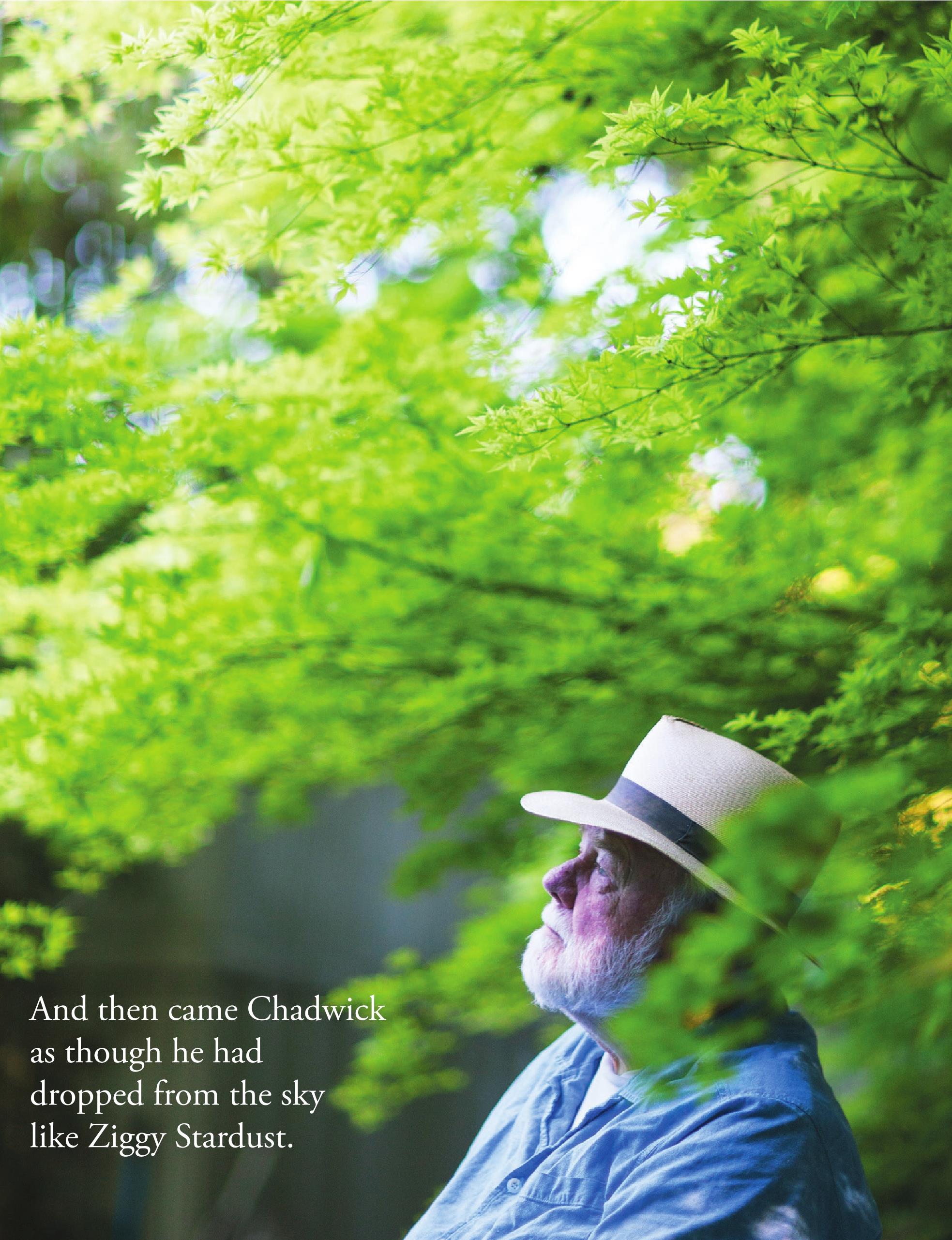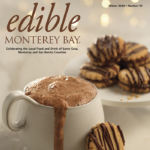
This summer marks the 50th anniversary of the UC Santa Cruz Farm & Garden, the heart of what would become the Center for Agroecology and Sustainable Food Systems, an internationally renowned leader in sustainable agriculture research and education. It was in 1967 that philosophy professor Paul Lee first envisioned a bountiful garden on campus, believing that the brand new university needed roots. Lee—who later went on to start the California Conservation Corps with Governor Jerry Brown and the Homeless Garden Project in Santa Cruz—hired English master gardener Alan Chadwick to create the garden. Edible Monterey Bay is delighted to publish Lee’s tribute to an extraordinary man:
***
He was called “the wizard” by radical philosopher Norman O. Brown, and referred to as such by avant garde composer John Cage, who went mushroom hunting with Alan Chadwick and then gave his mushroom reference library to UCSC because he was so enchanted by the man. A wizard he was although there are probably better terms to describe the charismatic power and influence he had on students who came under his spell.
It is 50 years since his arrival at the very moment when I had called upon Chancellor Dean McHenry to support a student garden for the campus in line with “flower power,” a popular slogan of the 1960s. The chancellor thought it was a good idea. And then came Chadwick as though he had dropped from the sky like Ziggy Stardust. We met at the Cowell College fountain and he said yes when I asked him if he would do our garden. The next day he went out and bought a spade and picked out the slope below Merrill College and started to dig. The rest is history.
Chadwick reintroduced “organic” under the theme of French intensive and biodynamic food and flower production, both of which eschewed the use of chemical fertilizers and pesticides. No more industrial society procedures heralded as “better living through chemistry.” I knew we were living in a historical period defined as the late stage of the self-destruction of industrial society; I and others wanted out. Chadwick showed us a way.
Here’s how it goes. Organic nature was supplanted by organic chemistry in the early part of the l9th century through the artificial synthesis of urea. It is a date you should know—1828. Friedrich Wöhler articially synthesized urea by heating up ammonium cyanate and getting what he thought was the same substance the kidney pro- duced—urea—the nitrogen part of urine. It made great fertilizer and was the basis for the plastics industry (poly-urethane). The move was made from the eld to the lab. It didn’t take long before factories were called plants! And so we got industrial society as a world superior to the given world of nature. Organic became a thing of the past—after all, chemicals were chemicals when you reduced everything to matter, which is exactly what reductionist physicalist science has done. So what’s the big deal? The long dislocation from reality had begun. Articial, synthetic, virtual, imitation, simulation, like… Count how many times you hear “like” in conversations today and think of it as the expression for the dislocation.
So organic had to be rediscovered and reaffirmed and that’s what Chadwick brought to the campus and eventually to the region.
Moreover, he brought a reverence for nature that students were looking for. You might even call it sacramental. A lot of them had seen eternity in a grain of sand thanks to LSD. They had undergone a transformation of consciousness and Chadwick was the mentor who would show them a new way in his reliance on strictly organic procedures, in his relation to creation. He espoused an organic worldview. I guess you could call it neo-vitalist where life was honored and respected and nurtured.
He introduced me to an economy of gift. Everything he grew he gave away and never wanted money. He hated the commercialization of food production as much as he hated mono-cropping and machines. He did hand work. He was an original artisan when it came to gardening. An economy of gift. What a nice ring to the phrase. It meant relying on the abundance nature provides—the principle of plenitude. Give and more will be given to you, pile it up and let it spill over your lap. I came to call it too much zucchini.
Ah, Chadwick, you were as much a trial as you were a gift, thanks to your awful temper tantrums left over from your experience on a minesweeper in the second World War. I was always willing to forgive your neurasthenia, and you taught me the difference between idiosyncratic display and institutional process. You were a forced fit when it came to the university, and it showed in the force of your fits.
And then it was over; short lived, when you think of the couple of years involved. But what an impact Chadwick made. I have an orotund way of putting it: He replanted the vital root of existence in the late stage of the self-destruction of industrial society as a world above the given world of nature. Yes, he did.

His influence was enormous. I think of the students who went on to become gardeners and farmers and carried on the organic lifestyle Chadwick revealed to them; Alice Waters and Chez Panisse; my nephew, Ben Ford, and his Chadwick restaurant in Santa Monica; Baker Roshi, who took Chadwick in after he left UCSC and had him start the Zen Center Farm at Green Gulch; Jerry Brown, during his first stint as governor, waiting to go in to hear Chadwick on his deathbed at Green Gulch Farm; Richard Wilson and the garden at Covelo; Betty Peck and the garden at Saratoga. They all testify to the magic and mystery of this man and his devotion to nurturing the earth and reaping its harvest.
How I wish I could hear him tell again and act out the nuptial flight of the queen bee and the fairy tales of the herbs, rosemary and calendula. We cherish your memory Alan, and all you gave to us; our gratitude knows no bounds.
Chadwick put Shakespeare’s Sonnet 15 on the wall next to his bed before he died. Shakespeare composed it for him:
When I consider every thing that grows
Holds in perfection but a little moment,
That this huge stage presenteth nought but shows Whereon the stars in secret influence comment;
When I perceive that men as plants increase,
Cheered and cheque’d even by the self-same sky,
Vaunt in their youthful sap, at height decrease, And wear their brave state out of memory;
Then the conceit of this inconstant stay
Sets you most rich in youth before my sight, Where wasteful Time debateth with Decay,
To change your day of youth to sullied night;
And all in war with Time for love of you, As he takes from you, I engraft you new.
About the author
At Edible Monterey Bay, our mission is to celebrate the local food culture of Santa Cruz, San Benito and Monterey Counties, season by season. We believe in sustainability, and we believe everyone has a right to healthful, clean and affordable food. We think knowing where our food comes from is powerful, and we hope our magazine, website and newsletters inspire readers to get to know and support our local growers, fishers, chefs, vintners and food artisans.
- Edible Monterey Bayhttps://www.ediblemontereybay.com/author/ediblemontereybay/
- Edible Monterey Bayhttps://www.ediblemontereybay.com/author/ediblemontereybay/
- Edible Monterey Bayhttps://www.ediblemontereybay.com/author/ediblemontereybay/
- Edible Monterey Bayhttps://www.ediblemontereybay.com/author/ediblemontereybay/



